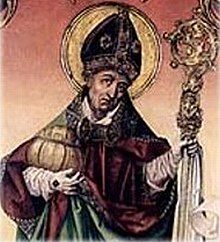Rupert of Salzburg
| Rupert of Salzburg | |
|---|---|

Saint Rupert depicted with a barrel of salt in his hand
|
|
| Bishop | |
| Born | 660? |
| Died | 27 March 710 Salzburg, Austria |
| Venerated in |
Roman Catholic Church Eastern Orthodox Church |
| Feast | 24 September 27 March |
| Attributes | Holding a container of salt; wearing clerical clothes including mitre; holding a crosier |
| Patronage | Salzburg, The State of Salzburg, Austria, salt miners |
Rupert of Salzburg (German: Rupprecht,Latin: Robertus, Rupertus; c. 660 – 710 AD) was the Bishop of Worms, the first Bishop of Salzburg, and the abbot of St. Peter's in Salzburg. He was a contemporary of Childebert III, King of the Franks and is a Saint in the Roman Catholic and an Eastern Orthodox Churches. Rupert is also a patron saint of the Austrian state of Salzburg.
Holy tradition states that Rupert was a scion of the Frankish royal Merovingian family, related to the Robertian dynasty, most likely the Count palatine Chrodbert.
Although Rupert was at first accepted as a wise and devout bishop, the mostly pagan community eventually came to reject him and forced him out of Worms. The Duke Theodo of Bavaria then requested that he come to Bavaria to help spread the Catholic faith.
Rupert moved to Altötting, where he converted the locals. He sailed down the Danube river, visiting many towns, villages and forts. Soon he had converted a large area along the Danube southward to the border with the Pannonian lands that were ruled by the Avars. Here he stayed at Lorch (the former Roman city of Lauriacum, today part of Enns).
...
Wikipedia
